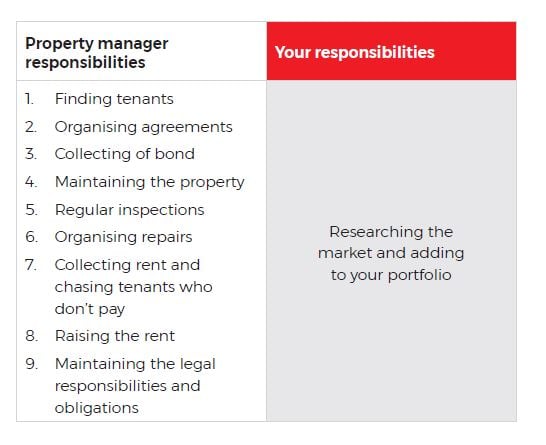BLOG
Subscribe to our newsletter
What to consider when deciding on property management

Property management – it’s not for the faint hearted. Inspections, maintenance, missed payments and listings, having tenants in your investment property is a part-time job.
If you’re building up your property portfolio, is managing tenants and maintenance really how you want to spend your time?
If not, why not consider using the services of a property manager? However, that comes with some consideration itself. After all, property managers charge a fee – money that could be going directly to you and your investment fund.
Such a decision requires careful consideration. In this blog, you will find information on the role of a property manager, their responsibilities, and an outline of the costs involved in using their service.
With this information, you will be able to make an informed decision on where your time and money is best spent and how you can protect your investment.
Why use a property manager?
You may have an investment property, or perhaps you have three, or maybe you are considering building up a nest egg for your future.
Wherever you are on your property journey, you’ve made an investment. And to ensure you get the best return, you need to protect it well.
A property manager will look after the day-to-day management of your property, while making sure your property is performing well and returning the right rent.
Not everyone needs a property manager. The key question to ask yourself is, what are you trying to achieve through your property investment?
If you live close by, have spare time (and energy!), and trust that you can get the best return, you may like to manage your own property.
However, if your goal is wealth creation then your time is best spent focusing on building your portfolio. That means leaving the day-to-day management to an expert.

Should my property manager be licensed?
Since the changes to the New Zealand Real Estate Agents Act 2008 came into effect, market conditions have changed. Licensing requirements are not in force for the property management industry, so anyone can set up a property management company and collect rent on your behalf.
Our property management team are all fully qualified with their Certificate in Residential Property Management, and they are constantly upskilled and trained on all the latest rules and regulations. The NZ Government is currently moving forward with plans to re-introduce licensing for the industry, which we welcome.
What is the cost?
Property management fees are generally calculated as a percentage of the rent.
Are management fees worth it?
How much is your time worth? When things are sailing along smoothly, you may get away with minimal time investment. But what happens when your tenants skip town, or the rent doesn’t come through?
Your property is your nest egg. It may be part of your retirement plan or part of a wealth creation plan. Either way, you have made a significant investment to purchase this property.
As a general rule, property managers usually charge between 7 and 9 per cent of the rent collected. They'll also charge you for any repairs carried out on your behalf.
Your property manager will collect the rent throughout the month. The rent will be transferred into your account at the beginning of each month.
Will I be involved?
It is your investment but you may not want to be visible. Using a property manager allows you to wear the owner hat without the drama the property manager hat can incur.
On the other hand, you may like to be involved.
You cannot turn up unannounced to your property. You need to give tenants at least 48 hours’ notice before an inspection and they must take place between 8am and 7pm. With a property manager in place, you can still be involved in inspections.
A formal inspection generally occurs every three months. You will receive a report outlining the results of each inspection. As the owner of the property, you are welcome to join the property manager if the scheduled inspection time suits.
Repairs, repairs, repairs
All properties have general wear and tear. As we all know, things don’t stay new forever.
Whether it’s a leaky tap, a blocked drain, overhanging trees or chipped paint, if something at your property needs repairing your tenants will contact you. If you fancy a bit of DIY, you can fix the problem yourself, otherwise you’ll need to call in the professionals.
With a property manager in place, the tenant will contact them directly. Depending on your arrangement, your property manager will contact you to seek instruction or go ahead and organise the repairs, if this is part of your maintenance agreement.
A regular, six-monthly property inspection will help keep repairs to a minimum as it provides your property manager with an opportunity to prevent repairs before they are needed. If you don’t mind regular communication with your tenants when they have a maintenance issue, either big or small, you may wish to manage the property yourself.
If your time is best spent concentrating on other aspects of property investment, this is certainly an advantage of having a property manager.
Protecting your investment
There are definite pros and cons to employing the services of a property manager. Only you can make that decision. But think carefully as to what is best for your investment portfolio in the long run.
Ask questions such as:
- Do I want tenants contacting me whenever anything goes wrong?
- Do I want to chase my tenants for missed payments?
- Would it be helpful to have a property manager’s support to find tenants?
- Should I spend time managing my properties or looking for my next investment?
The world of property investment is an exciting one. Whether you’re buying your first investment property or adding to your retirement fund, there are many returns to be made. If the industry knowledge and expertise of a property manager could enhance these returns, enlisting the services of such an expert may not be a bad investment after all.
Let Lodge City Rentals look after the day-to-day management of your property, from finding the right tenants to making sure your property is well looked after, rent is paid on time, and your property is returning the right rent. This means you can focus on growing your investment portfolio.
At Lodge City Rentals in Hamilton, our focus is on property management. We take care of your nest egg as if it was our own and will do whatever it takes to protect your investment.

